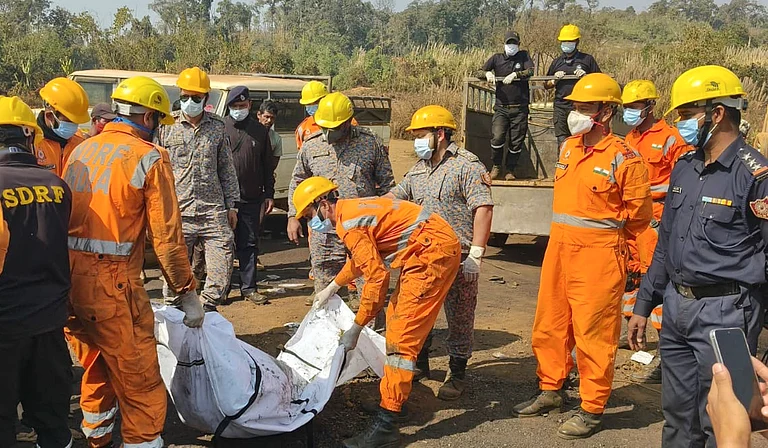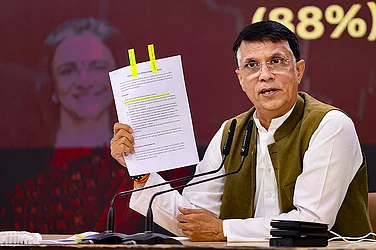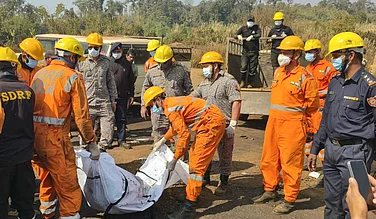Former Congress minister and present candidate of Bantwal constituency in coastal Karnataka, Ramanath Rai, begins his campaign from the Raja Rajeswari temple at Polali village in Bantwal Taluk on a hot and humid evening on April 12, 2023. It was the day of the traditional annual festival at the temple. Ramanath Rai religiously takes time to greet the devotees individually. He spends two hours in the temple walking around, meeting people and assuring that he will respect and protect their religious sentiments. There is no better place than a temple for this Congress candidate to kick off his campaign because he was defeated in 2018, allegedly for a controversial reference he had made during a public speech that “he had won multiple times due to the grace of Allah”. BJP leaders took no time to rise up to the occasion and made use of the opportunity in the 2018 election campaign. “This is an election between Ram and Rahim,” says V Sunil Kumar, the current minister for energy in the Karnataka cabinet in a public speech in January 2018. The BJP made a clean sweep in the region by winning 16 of the 19 seats across the three districts. (Later, in the by-election in 2019, the Congress lost one more seat).
Even Congress leaders think that Ramanath Rai’s reference expressing gratitude to Allah was unnecessary and untimely which caused his defeat in 2018. “The BJP used that opportunity to ignite communal passions. It worked,” says a senior Congress leader in Mangalore on the condition of anonymity. He says any statement which makes Muslims inclusive is misinterpreted as minority appeasement and threatening the Hindu community.
KPCC vice president P V Mohan observes that the Congress had no effective strategy to counter the communal polarisation in the coastal region of Karnataka, which is said to be the ‘laboratory of Hindutva in the South’. “When the Sangh Parivar introduced Hindu Samaj, even Congress workers joined the campaign, instead of being critical of an attempt to saffronise public space,” he says.
Ramanath Rai has won the Bantwal constituency six times since 1985. He was defeated by BJP’s Nagaraja Shetty in 2004, but won back the seat in 2008 and held on to it till 2013. But he once again lost the seat to Rajesh Naik of the BJP in 2018. “They tweaked my statement and spread communally volatile messages through the social media,” says Ramanath Rai.

The region referred to as the coastal belt—comprising the districts of South Kannada, North Kannada and Udupi—had traditionally been a stronghold of the Congress till 2013. Of the 19 seats across the three districts, the Congress won 13 in 2013, which was a slightly better performance compared to the 2008 election, when the party could win only seven seats. “The Congress made a remarkable victory in 2013, despite the BJP’s relentless efforts to create communal polarisation. The people rejected the aggressive Hindutva,” P V Mohan, KPCC vice president told Outlook. However, he holds the view that even the Congress failed to address the aggressive manifestation of Hindutva in the coastal region that had been gaining momentum since 1990.
The coastal region, which has been termed as the ‘laboratory of Hindutva in the South’ has been witnessing recurrent incidents of communal clashes, moral policing, hate speech, cow vigilantism and vandalising of Muslim/Christian places of worship since 2000. Between 2010 and 2012, the growth of virulent Hindutva was marked by 292 incidents of communal violence in different forms as hate speech, vandalising places of worship, physical assault, cow vigilantism and moral policing. Suresh Bhat Bakrabail, a secular activist who had been the president of Karnataka Communal Harmony Forum, has gathered this data based on media reports. However, the claim that the 2013 result was a sign of people’s aversion to aggressive Hindutva is only partly true. B S Yediyurappa’s departure from the BJP and the formation of his new party, Karnataka Janatha Paksha in 2012, was a major factor that hit the BJP in the 2013 Assembly polls. In 2013, the BJP could win just six of the 19 seats. But it managed to win 16 seats in 2018.
The Sangh Parivar has continued with its Hindutva experiments, which proved fatal for the Congress and the JDS in 2018; the Congress could win just three seats. The ‘Operation Lotus’ launched by the BJP in 2019 further brought down the number. Shivaram Hebbar, a Congress MLA from Yellapura in Uttara Kannada District quit and joined the BJP. He contested the by-election in 2019 and came back to the Legislative Assembly. When he contested the Congress panel in 2018, he managed to secure a slender majority of 1,458 votes. But in his new incarnation as the BJP candidate, his votes soared to 31,408 votes in the 2019 by-election.

JDS, which only has a slender presence in the region, ended up with zero seats in both the 2013 and 2018 polls. In Uttara Kannada District, JDS could win two seats in 2008 and managed to gain the second position in three constituencies in 2013. The situation worsened for JDS in 2018 when it managed to get the second position only in one constituency—Karwar in North Kannada.
“The Congress is focusing only on the failures of the Government—burning issues such as price hike of essential commodities and the rampant corruption,” says Ramanath Rai. When Outlook enquired as to how the Congress was going to deal with the communal campaign being raised by BJP, Ramanath Rai stuck to his point. “We are talking about issues that affect all sections of the society. Let Modi and Amit Shah come and go. We are not talking about them.” Though he did not make it apparent, it is becoming very clear that the Congress is playing down communal polarisation and is trying to garner attention to the failures of the State and Central Governments. Having burned his fingers in 2018, Ramanath Rai probably does not want to create another opportunity for the BJP to make a call ‘to choose between Ram and Rahim’. The Congress leaders whom Outlook met in the region made it clear that corruption and the price rise are the two major campaign themes that the party is focusing on. “I believe that talking about such issues that affects everybody would be more effective,” says P V Mohan.
On the other hand, the ruling BJP too seems to have shifted gears as it has sensed that aggressive polarisation tactics can backfire. In a recent statement, the Minister for Energy Sunil Kumar, who is in-charge of Dakshina Kannada, told the media that the “anti-Muslim campaigns were being carried out by the fringe elements”, who are not associated with the BJP. The fringe groups he was referring to include the Sriram Sena and the Hindu Janajagruti Samiti, who are apparently unhappy with the BJP’s new tactic. Sriram Sena leader Pramod Muthalik has already announced that he would contest against all parties. According to him, the Sena will field candidates across 25 constituencies in the coastal region. Muthalik claims that he stands for “the real Hindutva against the fake Hindutva of the BJP”. As far as the Congress is concerned, the party is relying on the conflicts between the Parivar groups, internal fights in the BJP and anti-incumbency, which is apparently strong in the state. However, the Congress is facing an acute scarcity of foot soldiers to work on the ground level. “It is a fact that the party lacks cadres to work at the booth-level. BJP’s strength lies in their ground level workers, Congress is not a cadre party, but a mass party,” says Mohan. “We will get booth level workers only if we have money. The BJP in 2018 had one person for each page of the voter’s list,” says a district-level Congress leader in Mangalore. He refers to the BJP’s strategy of employing one person for every 20 persons on the voter’s list.

The Congress is trying to woo voters by promising to bring back the ‘good old days of Siddaramaiah’. “The tenure of the Congress under his Chief Ministership in 2013 was one of the best in the history of the state. Of the 165 promises in the manifesto, the Government delivered on 159 pledges,” claims P V Mohan. The Congress hopes that the ‘guarantee cards’ distributed to the people would create a wave of support for them. The card offers 200 units of electricity and 10 kg of rice free of cost for each household; monthly allowance of Rs 2,000 for unemployed married women; and Rs 3,000 for graduated and unemployed youth. It is clear that the Congress is pushing the governance debate on the electoral table, while keeping issues related to communal polarisation at bay.
Shahina K K in Mangalore
(This appeared in print as Belated Makeover)


























